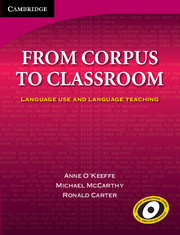Book contents
- Frontmatter
- Acknowledgements
- Contents
- Preface
- 1 Introduction
- 2 Establishing basic and advanced levels in vocabulary learning
- 3 Lessons from the analysis of chunks
- 4 Idioms in everyday use and in language teaching
- 5 Grammar and lexis and patterns
- 6 Grammar, discourse and pragmatics
- 7 Listenership and response
- 8 Relational language
- 9 Language and creativity: creating relationships
- 10 Specialising: academic and business corpora
- 11 Exploring teacher corpora
- Coda
- References
- Appendix 1
- Appendix 2
- Appendix 3
- Author index
- Subject index
- Publisher's acknowledgements
11 - Exploring teacher corpora
Published online by Cambridge University Press: 23 December 2009
- Frontmatter
- Acknowledgements
- Contents
- Preface
- 1 Introduction
- 2 Establishing basic and advanced levels in vocabulary learning
- 3 Lessons from the analysis of chunks
- 4 Idioms in everyday use and in language teaching
- 5 Grammar and lexis and patterns
- 6 Grammar, discourse and pragmatics
- 7 Listenership and response
- 8 Relational language
- 9 Language and creativity: creating relationships
- 10 Specialising: academic and business corpora
- 11 Exploring teacher corpora
- Coda
- References
- Appendix 1
- Appendix 2
- Appendix 3
- Author index
- Subject index
- Publisher's acknowledgements
Summary
Introduction
This chapter is very different from all of the other chapters in this book from a number of perspectives. Up to this point, we have focused on what corpora can teach us about language in use and what, in turn, this tells us about language teaching. Here we are not looking at what we can learn about language use from a corpus, rather we are looking at what corpora can tell us about our own teaching and ourselves as part of a professional cohort. For example, we draw on corpora of classroom interactions and compare them with other question-driven institutionalised contexts, such as media interviews, to show what makes classroom interactions different. We also look at the specifics of teacher talk, for example we survey studies of teacher questioning strategies and wait-time (after questions have been asked) based on corpus data collected in the language classroom. The overall aim of this chapter is to make a case for the development of corpora and corpus skills as a tool for reflective practice within pre-service teacher education and ongoing in-career development.
Another reason why this chapter differs so much from other chapters is because here we do not see a teacher corpus as something which is ‘off-the-shelf’. A teacher corpus is something small and evolving over time. In this chapter we look at very small amounts of data very closely, usually turn by turn.
- Type
- Chapter
- Information
- From Corpus to ClassroomLanguage Use and Language Teaching, pp. 220 - 245Publisher: Cambridge University PressPrint publication year: 2007



